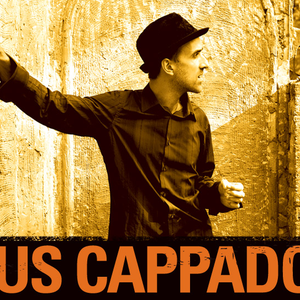
| Trackimage | Playbut | Trackname | Playbut | Trackname |
|---|---|---|---|---|
| 83629627 | Play | Lament | 00:00 Tools | |
| 83629628 | Play | Prayer | 00:00 Tools | |
| 83629629 | Play | Transformation | 00:00 Tools | |
| 83629630 | Play | Melodie | 00:00 Tools | |
| 83629631 | Play | Forgiveness | 00:00 Tools | |
| 83629632 | Play | Element | 00:00 Tools | |
| 83629633 | Play | Transformation (Video Version) | 00:00 Tools | |
| 90270813 | Play | PRAYER (ST JOHN S NEWFOUNDLAND CAN | 00:00 Tools | |
| 83629634 | Play | Forgiveness ♫.★.♫ | 00:00 Tools | |
| 83629635 | Play | 16 - Prayer | 00:00 Tools |

-
- 8,856
- plays
-
- 1,124
- listners
-
- 8856
- top track count
A native of Hamilton, Ontario, Cappadocia picked up his first cello at the age of three, but to call him a prodigy is to miss the point. “I’ve always had a problematic relationship with my instrument,” he muses. “It’s been the essential means of expression for me, but the standard career paths it can lead you down leave a lot to be desired.” Cappadocia realized early on that the strictures of classical music couldn’t come close to capturing the soaring sounds he heard in his head. “The first time I ever heard a walking bass line, something stirred deep inside. When I heard B.B. King’s ‘The Thrill Is Gone’ for the first time, I actually wept. It was like suddenly discovering that I hadn’t been alone all that time.” Cappadocia moved to Montreal to attend McGill University, where he spent hours in its library’s ethno-musicology department, discovering everything from the Pygmy chants of the West African rain forest to vintage Bulgarian folk recordings. “It was a tremendously productive time,” he enthuses. “I was learning Hendrix and Coltrane riffs note-for-note. I got deeply in the city’s progressive jazz scene and developed and built a solid-body five string electric cello, so I could hold my own with other electric instruments. Eventually I’d hook it up to a battery and play on the streets and in the subway stations.” Leaving school, Cappadocia relocated to Europe, where his busking landed him in Southern France and, eventually, Spain, where he was first exposed to the mix of Romish and Arabic influences that reached their apotheosis in Flamenco. “I used it all,” he says. “The slapping techniques on the guitar; the way the dance steps carried the rhythms. It was all part of a search for something, even if I didn’t know exactly what I was looking for.” That search would subsequently lead him to New York where he set up a more or less permanent base, intent, in his words, “on playing with as many different musicians as I could. If my travels had taught me anything, it was the value of playing with other artists.” In short order Cappadocia joined the multi-faceted jazz ensemble, The Paradox Trio, though the nomadic artist was embraced by virtually every artist and musical community he sought out, including such widely assorted musicians as Celtic pioneer Seamus Eagan and master Haitian drummer “Bonga” Jean-Baptiste with the Voodoo Drums of Haiti; musical polymath Ross Daly, who was instrumental in introducing Cappadocia to Middle Eastern and Balkan music; Vishal Vaid, a virtuoso Indian Ghazal vocalist and guitarist David Fiuczynski, with whom he formed the Eastern Modal fusion group, Kif. Add to this list such marquee names as Aretha Franklin, Odetta, Cheick Tidiane Seck, and Vernon Reid, former guitarist of Living Color – all of whom Cappadocia has worked with – and his reputation as a world-class artist with a world-spanning musical reach makes perfect sense. And, like that list, it’s a reputation that continues to grow as the cellist forges new alliances in the most unlikely musical domains. Read more on Last.fm. User-contributed text is available under the Creative Commons By-SA License; additional terms may apply.